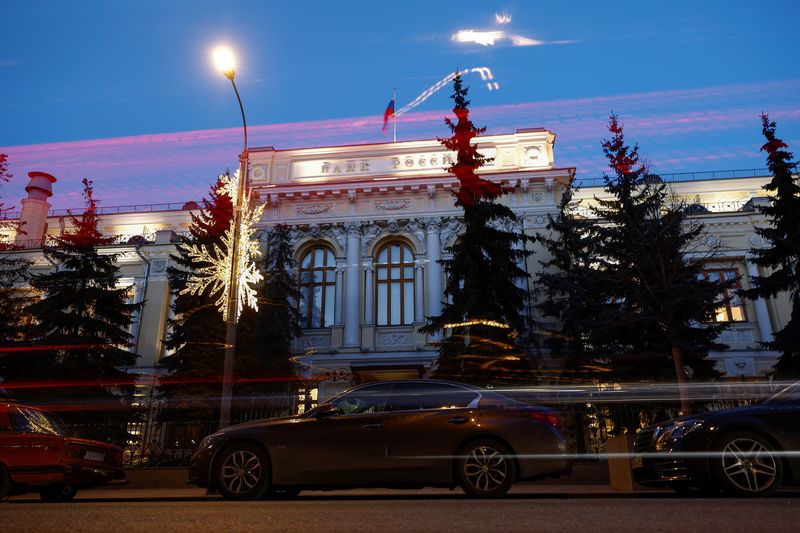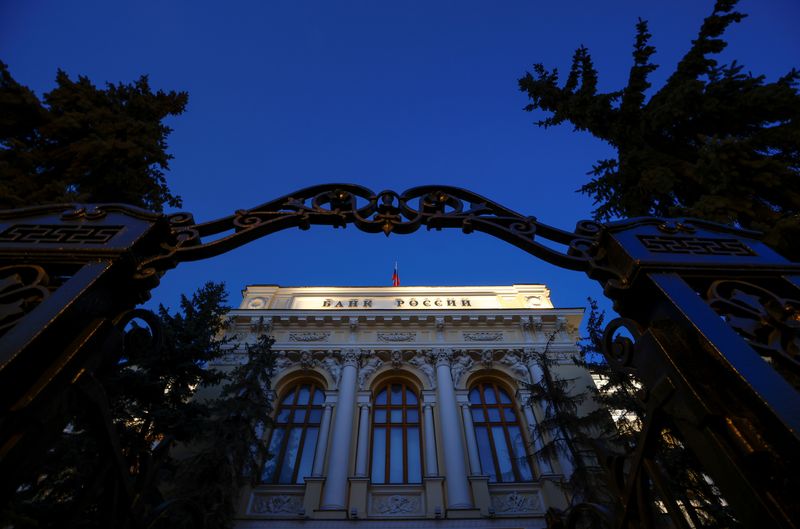(Reuters) - Russia's central bank more than doubled its key policy rate on Monday and introduced some capital controls as the country faced deepening economic isolation, but its governor said sanctions had stopped it selling foreign currency to prop up the rouble.
The admission that restrictions had effectively tied the Bank of Russia’s hands underscores the ferocity of the backlash to Moscow's invasion of Ukraine and Western allies' success in restricting its ability to deploy some $640 billion of foreign exchange and gold reserves.
"The central bank today increased its key rate to 20% as new sanctions triggered a significant deviation of the rouble rate and limited the central bank's options to use its gold and foreign exchange reserves," Governor Elvira Nabiullina told a news conference.
"We had to increase rates to compensate citizens for increased inflationary risks."
Western sanctions had earlier sent the rouble tumbling nearly 30% to record lows. It clawed back some ground after the central bank raised its main interest rate to 20%, the highest level this century, from 9.5%.
The Bank of Russia sold $1 billion on foreign exchange markets on Thursday, Nabiullina said, but did not intervene on Monday.
That suggests the rouble was supported by other unnamed market participants.
Russia's central bank also said that stocks and derivatives trading on the Moscow exchange will remain closed for a second day on Tuesday. Russian stock markets and derivatives markets were closed on Monday to gird against further losses.
On Monday, the central bank and the finance ministry ordered exporting companies, which include some of the world's biggest energy producers from Gazprom (MCX:GAZP) to Rosneft, to sell 80% of their forex revenues on the market, as the central bank's own ability to intervene on currency markets was curbed.
Dmitry Polevoy, head of investment at Locko Invest, estimated that Russian exporters could offer $44 billion-$48 billion per month to support the rouble provided oil prices stayed around current levels and there were no sanctions on energy exports.
"This looks sufficient to stabilise the market in the next couple of weeks," he said.
Sanctions targeting Russia's energy sector remain on the table, White House press secretary Jen Psaki said on Monday.
The central bank temporarily banned Russian brokers from selling securities held by foreigners, although it did not specify assets for which the ban applies. It also said it would resume buying gold on the domestic market.
Russian President Vladimir Putin ordered a ban on foreign exchange loans and bank transfers by Russian residents to outside of Russia from March 1, the Kremlin said on Monday, in retaliation for economic sanctions imposed on Moscow by the West.
The United States and Britain banned their citizens or entities from transacting with the central bank, Russia's National Wealth Fund or the Russian finance ministry.
Switzerland said it would adopt European Union sanctions against Russians involved in the invasion of Ukraine and freeze their assets, in a major departure from the neutral country's traditions.
"If Russia continues on its current path, it is quite easy to see how the latest sanctions could be just the first steps in a severe and enduring severing of Russia’s financial and economic ties with the rest of the world," wrote Oliver Allen of Capital Economics in a report.
DEMAND FOR CASH
Russia's major banks have also been excluded from the SWIFT messaging network that facilitates trillions of dollars' worth of financial transactions worldwide, making it hard for lenders and companies to make and receive payments.
Nabiullina said Russia had an internal replacement for SWIFT to which foreign counterparties would be able to connect, but did not give details.
She said the banking sector faces "a structural deficit of liquidity" because of high demand for cash, and that the central bank was ready to support it.
"The central bank will be flexible to use any tools needed ... banks have enough coverage to raise funding from the central bank," Nabiullina said.
Russians had queued outside ATMs on Sunday, worried the sanctions could trigger cash shortages and disrupt payments.
All banks would fulfill their obligations and funds in their accounts are safe, Nabiullina said, although the central bank was recommending that banks restructure some clients' loans.
The European arm of Sberbank, Russia's biggest lender, was set to fail, the European Central Bank warned on Monday, after a run on its deposits sparked by the backlash from Russia's invasion of Ukraine.
Nabiullina said further monetary policy decisions would be driven by the central banks' assessment of external risks, adding that it would be flexible in its decisions given the "non-standard situation" faced by the financial system and economy.
The rouble finished trading down around 14% to the U.S. dollar.
DEBT DEFAULT?
The Institute of International Finance (IIF), a trade group representing large banks, warned on Monday that Russia was extremely likely to default on its external debts and its economy will suffer a double digit contraction this year after the fresh reprisal measures by the West.
The central bank and finance ministry did not immediately respond to a Reuters request for comment on the IIF assessment.
An order that Russian brokerages reject sell orders for Russian securities from foreign clients could complicate plans by the sovereign wealth funds of Norway and Australia to wind down exposure to Russian-listed companies.
It was also unclear how energy major BP (NYSE:BP) Plc, Russia's biggest foreign investor, would follow through on a decision to abandon its stake in state oil company Rosneft at a cost of up to $25 billion.
JPMorgan (NYSE:JPM) Asset Management suspended its JPM Emerging Europe Equity fund on Monday, a source familiar with the matter said, and Denmark's Danske Invest said it had suspended trading in equity funds with a significant exposure to Russian shares.
Global bank HSBC and the world's biggest aircraft leasing firm, AerCap, are among other Western firms looking to exit Russia over its actions in Ukraine, which Moscow characterises as a "special operation."

UK-listed depositary shares of Russian companies plummeted, including those of gas giant Gazprom and Sberbank .
“We are witnessing prices for Russian ADRs that we haven't seen for literally decades,” said Michael Kart, a partner at investment firm VLG Capital. “This is certainly the most devastating hit ever taken by the Russian securities market."
